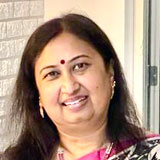A Slice of Bengal in Europe
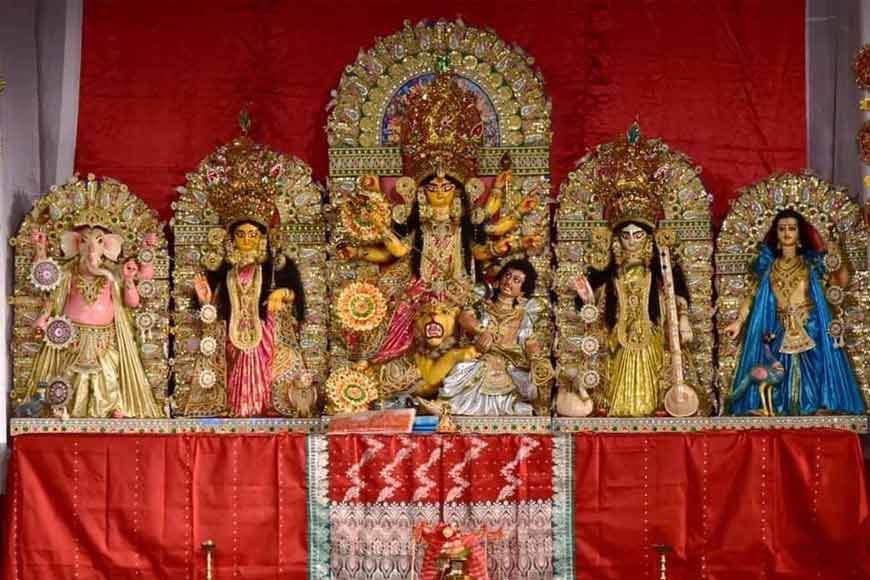
Chaitali is a published writer, translator, journalist and language teacher based in Netherlands
Fall is almost on its way and nature in the European cities is especially charmingly stunning during the autumn. This is the magical time when the trees are transformed into a blaze of color. A casual stroll over the bridge near your home would give you picturesque views of all the orange, rust, and red hues of the season. Europe, with its endless rolling hills, quaint manors, sprawling vineyards, rushing rivers, and trees galore is filled with more autumn shades than you might have thought to have existed. The quintessential Bengali’s heart draws the pictures of glimmering ‘kaash’ against the azure, KLM blue European skies, imagines the languorous fragrance of ‘shiuli’ in the foreign air, and his mind leaps back to his childhood, the grand Durga Puja celebrations at home. The fragrant pine air is a whisper around him. Ma is coming! The five-day annual festival of Mother goddess Durga.
As a probashi Bengali, for the past twenty years, Durga puja for me has been synonymous with the festival of the Mother Goddess in Chorweiler, Cologne in Germany. Although I’ve visited other pujas every year, the traditional puja of Cologne is still very close to my heart. Started in 1992, this puja is one of the oldest and largest pujas in Europe.
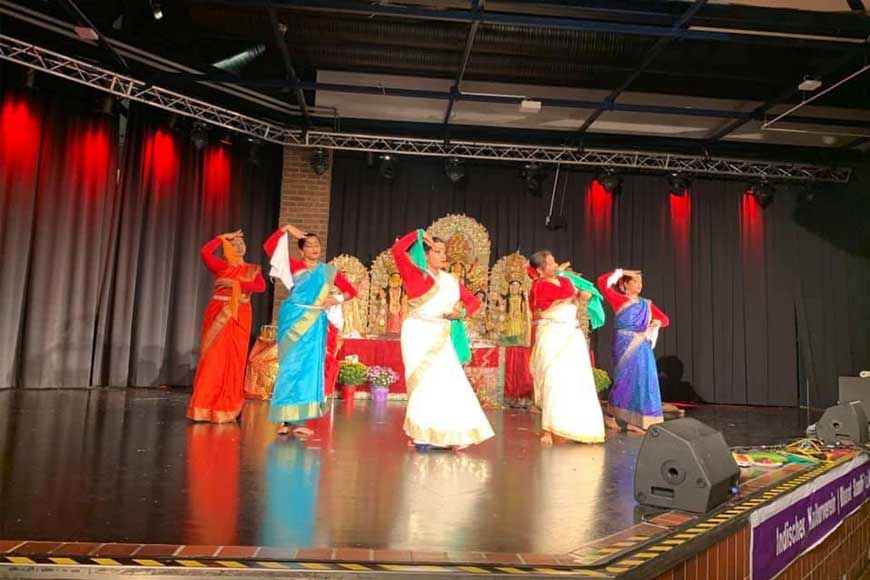
Durga Puja in Cologne was started by the veteran members of Bharat Samiti 29 years back and is celebrated in the most authentic Bengali manner. Very well-organized and its ambience closely relatable to the Maddox Square in Kolkata, this puja does not have any entry fee. In this age of stifling consumerism, this puja is still funded by the donation of their members and visitors. The puja in Cologne has always been a five-day festival in a typically Bengali tradition. Unlike many other pujas throughout Europe and the USA, it is not celebrated on a weekend! Not only the Bengalis residing in the Ruhr region of Germany but also Bengalis from the neighboring Netherlands and Belgium attend the Puja in Cologne. On many Astami and Nabami evenings, the footfall easily crosses over 1000!
“The genuine warmth of its hosts, who always welcome us with a sparkle in their eyes and their sincere efforts to make each visitor feel at home- this is the reason why I return to this puja every year. I don’t bother about my identity here, everyone is welcome. I believe this is one of the hallmarks of the Puja in Cologne,” says Satyaki Das, a student studying at the University of Bonn. He was not wrong. Year after year, many have flocked to Cologne to cherish this inclusiveness.
In the nostalgic five-day affair held according to the calendar in Cologne most experience a near similar festive environment with same traditions, food, adda, cultural events, and music, like in Kolkata. “Yes, there’s definitely that feel of home here. An authentic experience,” says Madhumita, a visitor from Brussels. “I come here not merely as a spectator, but we are often enthusiastically welcomed to participate in volunteering in their kitchen to chop vegetables or even to serve food to the guests. It is that sarbajanin (community) feeling that I carry each time I leave from here.” Pitted against the modern carnival look, the traditional puja in Cologne retains its simple charm.
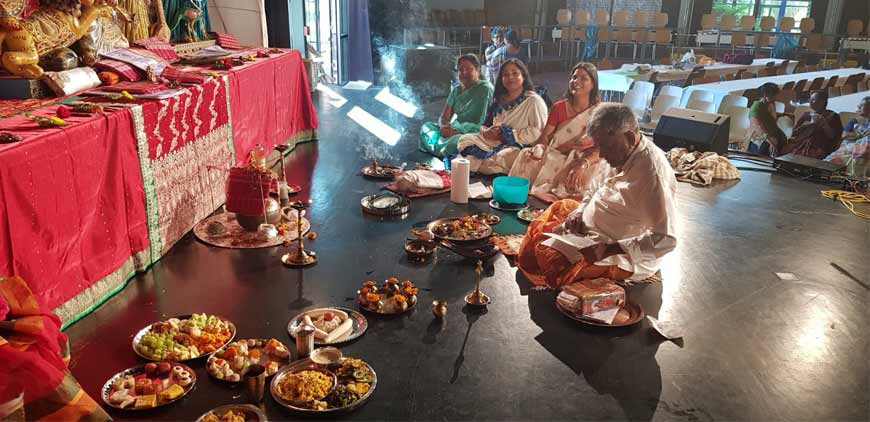
Durgotsav in the Netherlands and Belgium
The sounds of ‘dhak’ (drum) and ‘sankh’ (conchshell), the smell of incense, Kichuri bhog and the sight of Ma Durga’s glorious ensemble is not missing from the neighboring countries of Germany, especially in the Netherlands and Belgium. The desire of the Bengali diaspora to keep their cultural ties alive and to pass on tradition to their next generation has been responsible for the growing number of Durga Puja in the Netherlands and Belgium. Come the beautiful autumn, the rustic, golden colors of fall announce the arrival of Durga Puja in the Dutch cities of Rijswijk (Kallol, Indian Bengali Association in the Netherlands), Amstelveen (Hoichoi and Anandadhara), and Eindhoven (Bongohoven). The country witnesses four Durga puja, organized by various Bengali groups. While these four groups present community puja, the Netherlands also witnessed the start of family puja performed privately by Pallab Roy in Lelystad. A privately held Durga Puja welcoming numerous guests, bringing back the dedication and charm of Bonedi Durgotsav.
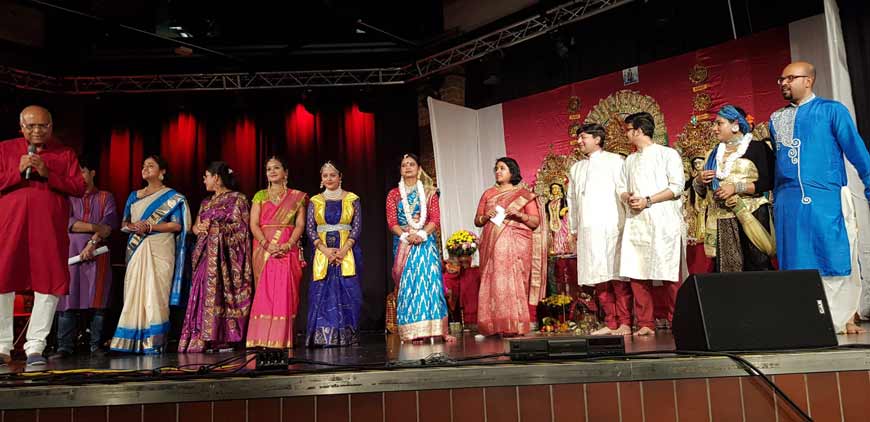
Side by side, in Belgium too, the Bengali Expats organizations showcase Bengali culture and festival with great fervor and enthusiasm. Brussels Sarbajanin Puja Samity and ‘Tero Parbon’ host the puja celebrations in Brussels. This year the Cultural Association EU will also celebrate Durga Puja and Navaratri in Antwerpen. The steadily growing Bengali community in the major cities of Germany, the Netherlands and Belgium embrace their roots in the grandest way possible in the mellowed autumn months. If you feel that there are too many pujas in proximity, after past two years of covid lull, for most people this offers a true feeling of ‘pandal hopping’ thousands of kilometers far away from home. And with such diasporic enthusiasm, Durga is now an international phenomenon!






